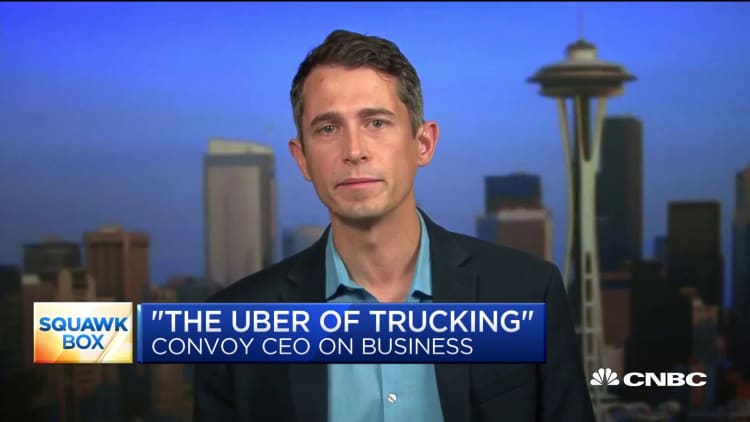Convoy, a Seattle-based trucking logistics start-up, has raised $400 million in a venture round co-led by Generation Investment Management, Al Gore's sustainable investment management firm.
Described by some as the "Uber of trucking," Convoy uses a digital platform to match trucking companies, truck drivers and shippers. Founded in 2015 by former Amazon executives Dan Lewis and Grant Goodale, Convoy aims to aid the fragmented trucking market by connecting small trucking businesses with shippers using a mobile app. With truck drivers collectively racking up 93 billion highway miles in the U.S. every year, 40% of the trips are made with empty trailers.
Convoy has now raised a total of $668 million and the new deal was completed at a reported valuation of $2.7 billion, almost triple its former valuation of $1 billion reported at the time of its last fundraising in 2018.
Amazon founder and CEO Jeff Bezos and Microsoft founder Bill Gates are among existing investors in Convoy, which made the 2019 CNBC Disruptor 50 list.
"When it's that fragmented it's hard to make everything work efficiently," Lewis, Convoy's CEO, told CNBC's Squawk Box on Wednesday in an interview after the fundraising was announced. "What Convoy does is we take all those jobs, put them in our platform ... and we find the ideal matches, significantly reducing empty miles and reducing waste in the system so that everyone can benefit."
The trucking business is a large market worth hundreds of billions of dollars. However, the market is mostly made up of small trucking companies, with 91% of companies having six trucks or fewer. Convoy uses data-driven software to match big customers, like GE and Home Depot, with small truck companies.
Shipping companies can use the app to post a job, find a match and track the shipment. Convoy, which ranked No. 11 on CNBC's 2019 Disruptor 50 list, can consider "tens of thousands of trucks at the same time," and matches customers the best option, making the process more efficient by ultimately saving time, money and CO2 emissions.
"Higher productivity is the key to higher earnings," Lewis said.
According to the former Amazon executive, truck drivers cover 45% less empty miles when using programs like Convoy's Automated Reloads, which provides drivers with two or three jobs at once instead of just one, optimizing pick up and drop off locations to increase productivity.
As competing companies enter this fleet management industry, like Uber Freight, Fleetio and KeepTruckin, Lewis sees an opportunity for consolidation and an increase in efficiency.
"As we get more and more jobs under our platform, more and more trucks, it gets significantly more efficient," Lewis said. "So I actually think there's an opportunity for consolidation in the market through gains in efficiency, and several players to be successful over time."
As autonomous vehicles enter the picture, productivity and safety could increase further, he said.
"The biggest challenge today is that truck drivers are limited to 11 hours per day with government regulations," Lewis told CNBC.
Self-driving vehicles would increase the amount of hours they can drive, allowing them to be more productive.
However, Lewis added it will be a long time before drivers won't be necessary. Drivers may be needed in order to navigate complicated driving situations that self-driving vehicles would be unable to handle.
"That's a very, very long ways off," Lewis said. "I don't think truck drivers can be out of trucks for a very long time."
The recent funding had additional participation from Baillie Gifford, Fidelity Management and Research Co., Durable Capital Partners LP and Series C investors CapitalG and Lone Pine Capital.







